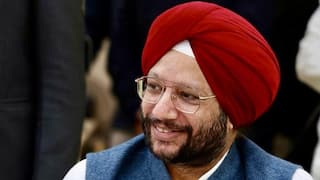Himanta Biswa Sarma Says BJP Doesn’t Need Votes of ‘Communal’ Miya Muslims In Assam Assembly Elections
Talking about the Citizenship Amendment Act, the BJP leader said it is “entirely up to the Government of India to frame” the rules with regard to the same. The Lok Sabha passed in 2019 the Citizenship Amendment Act aimed at giving Indian citizenship to illegal migrants of six communities -- Hindu, Sikh, Buddhist, Christian, Parsi and Jain -- who have migrated from Bangladesh, Pakistan and Afghanistan.

With the Assam assembly elections due in April-May this year, electioneering has taken another gear in the state. AIUDF chief Badaruddin Ajmal in a recent campaign speech called BJP a threat for Muslims residing in the state. Now a BJP leader's statement is making rounds which accuse migrant Muslim residents in Assam as "communal".
Senior Bharatiya Janata Party (BJP) leader and Health, Education and Finance Minister Himanta Biswa Sarma on Wednesday said the party does not need votes from those openly challenging the “Assamese culture, language and composite Indian culture”.
Himanta Biswa Sarma was taking potshots at the Miya Muslims (migrant Muslims in Assam) for being “very communal”. Sarma alleged the Miya Muslims are involved in various activities to distort the state’s culture and language.
“Assam Muslim population is divided into two streams; one who has come to Assam from Bangladesh and other who are indigenous. Some people who had come to Assam at different point of times have started to identify themselves as Miya and they are very communal," Sarma told media in Guwahati.
“They are involved in various activities to distort Assamese culture and language. My personal opinion is that the people who openly challenge Assamese culture, language and composite Indian culture should not vote for us,” he added.
Talking about the Citizenship Amendment Act, the BJP leader said it is “entirely up to the Government of India to frame” the rules with regard to the same.
The Lok Sabha passed in 2019 the Citizenship Amendment Act aimed at giving Indian citizenship to illegal migrants of six communities - Hindu, Sikh, Buddhist, Christian, Parsi and Jain - who have migrated from Bangladesh, Pakistan and Afghanistan.
Under the Act, the people from these communities who had come to India till December 31, 2014, due to religious persecution in the three countries will not be treated as illegal immigrants but given Indian citizenship.
Commenting on the National Register of Citizens (NRC), Sarma said: “We have already pointed out many anomalies in the implementation process of the first National Registration.”
The Union Ministry of Home Affairs had earlier told a parliamentary panel that the Central Government has not yet taken any decision on the roll-out of the NRC for the entire country.
The NRC update was carried out in Assam to identify bona fide Indian citizens living in the state. The move had, however, created a nationwide uproar.
Related Video
Uttarakhand News: Winter Chill Grips North India; Kedarnath Dham Covered in Snow
Top Headlines





































